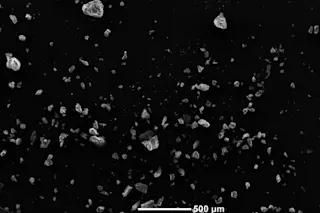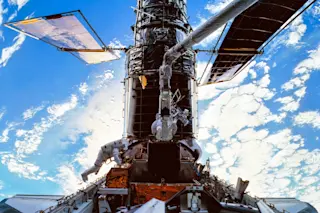Early in the next century, NASA hopes to send an unmanned probe to Mars that would return to Earth with Martian rocks--and perhaps even evidence of life. Aerospace engineer Michael Roberts, recently retired from the Johnson Space Center in Houston, has been looking for new ways to safely land such a probe, both on Mars and after the return trip to Earth. Current plans call for parachutes to slow a spacecraft’s descent. But Roberts thinks he has a better idea. Instead of dangling from a parachute, a space probe--or even a manned capsule--would sit within a new type of landing device, one without cables to tangle with, that would ensure safer landings on even the roughest terrain. The new lander’s rate of descent would also be somewhat faster than that of a parachute, decreasing the amount of drift.
Although a prototype has yet to be built and tested, Roberts is ...














